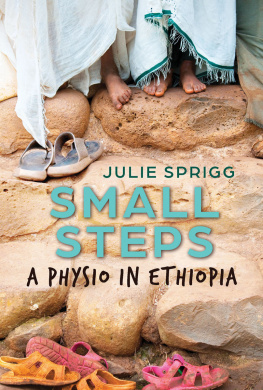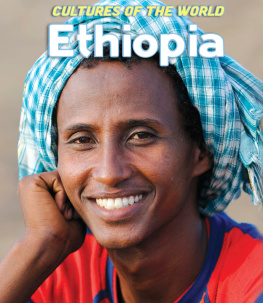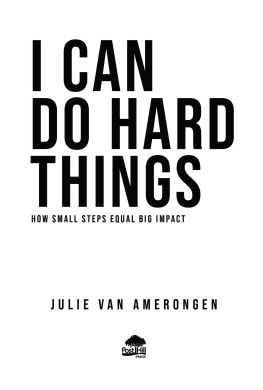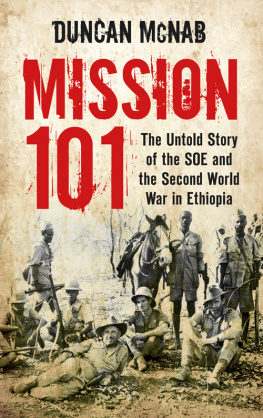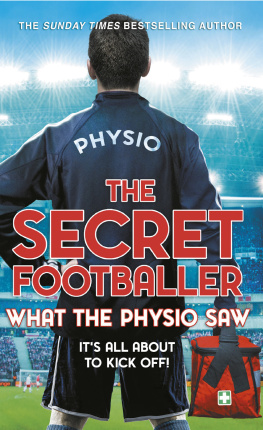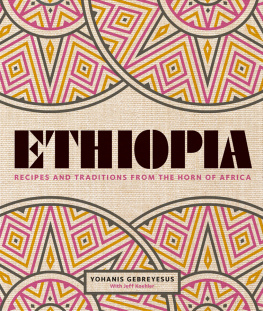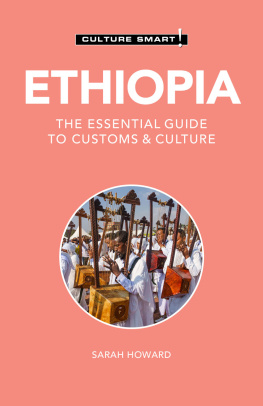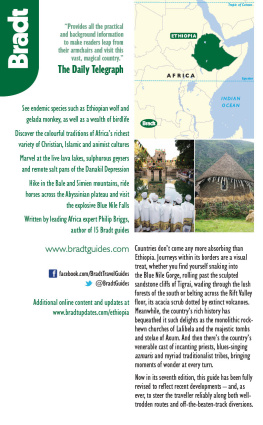Julie Sprigg - Small Steps: A Physio in Ethiopia
Here you can read online Julie Sprigg - Small Steps: A Physio in Ethiopia full text of the book (entire story) in english for free. Download pdf and epub, get meaning, cover and reviews about this ebook. year: 2020, publisher: Fremantle Press, genre: Detective and thriller. Description of the work, (preface) as well as reviews are available. Best literature library LitArk.com created for fans of good reading and offers a wide selection of genres:
Romance novel
Science fiction
Adventure
Detective
Science
History
Home and family
Prose
Art
Politics
Computer
Non-fiction
Religion
Business
Children
Humor
Choose a favorite category and find really read worthwhile books. Enjoy immersion in the world of imagination, feel the emotions of the characters or learn something new for yourself, make an fascinating discovery.
- Book:Small Steps: A Physio in Ethiopia
- Author:
- Publisher:Fremantle Press
- Genre:
- Year:2020
- Rating:5 / 5
- Favourites:Add to favourites
- Your mark:
- 100
- 1
- 2
- 3
- 4
- 5
Small Steps: A Physio in Ethiopia: summary, description and annotation
We offer to read an annotation, description, summary or preface (depends on what the author of the book "Small Steps: A Physio in Ethiopia" wrote himself). If you haven't found the necessary information about the book — write in the comments, we will try to find it.
Small Steps: A Physio in Ethiopia — read online for free the complete book (whole text) full work
Below is the text of the book, divided by pages. System saving the place of the last page read, allows you to conveniently read the book "Small Steps: A Physio in Ethiopia" online for free, without having to search again every time where you left off. Put a bookmark, and you can go to the page where you finished reading at any time.
Font size:
Interval:
Bookmark:
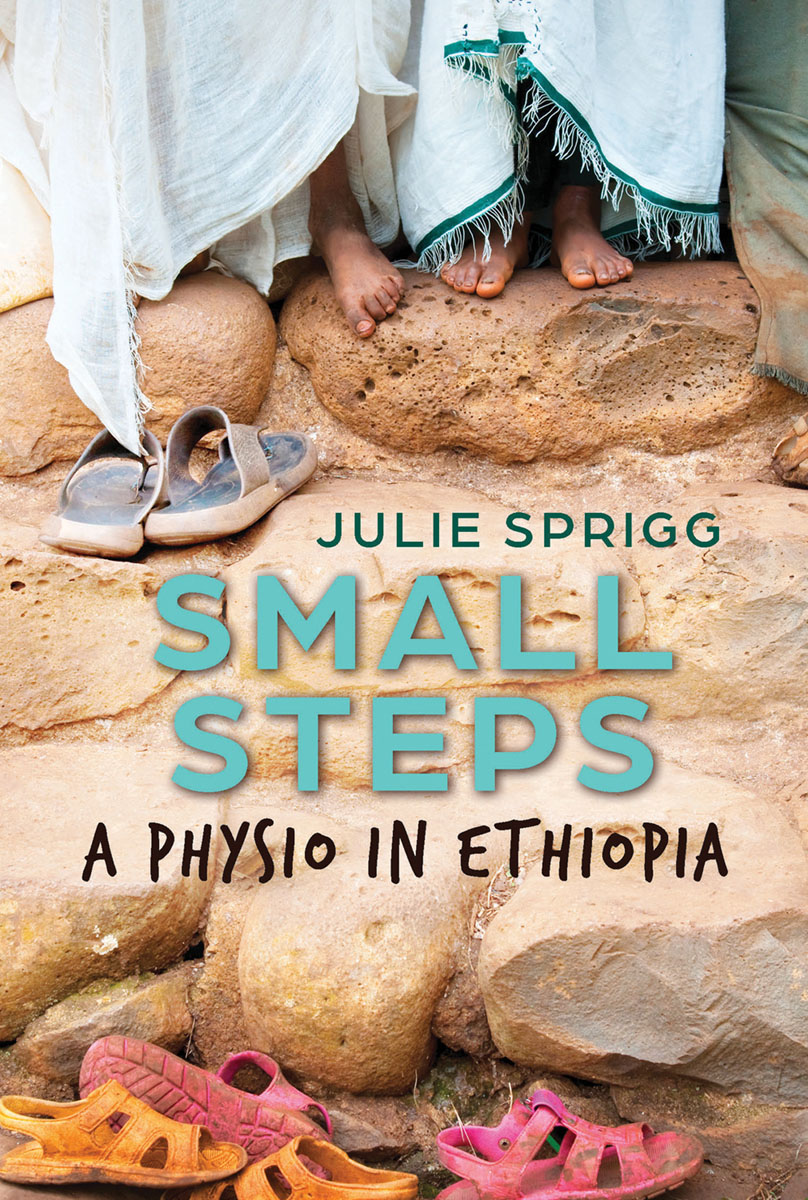


Julie Sprigg is a Perth-based author whose debut book, Small Steps: A Physio in Ethiopia, was shortlisted for the 2018 City of Fremantle Hungerford Award. She worked as a physiotherapist for ten years before switching to a career in foreign aid with programs improving human rights of people with disabilities. After years of regular travel to China, India, Bangladesh, Cambodia, Vietnam, Vanuatu and Ethiopia, Julie returned to Perth and now evaluates government programs to overcome social disadvantage. When not writing or working she can be found reading a picture book atlas with her young son and delighting in domestic adventures.
Published with support from the Dorothy and Bill Irwin Charitable Trust
This is a work of creative non-fiction. All character names and identifying characteristics have been changed, with the exception of Tadesse and Marieke who agreed to appear as themselves. To former colleagues and students of University of Gondar, I wish there was space to write about all of you and your dedication to your work.
My first patient arrived tied to his mothers back like an overgrown baby. The mother panted from the effort of carrying him on her back up the hill to the clinic and looked relieved to untie him. She crouched as she loosened the torn strips of cotton and the child gently slid to the mat.
Set high in the mountainous outskirts of Ethiopias capital city Addis Ababa, the clinic was inside a converted shipping container with a door and windows cut into the metal walls. It was just big enough to fit a desk, a low plinth, a bench and a blue floor mat. Physio equipment was crammed into any remaining space. Although it was still early on that morning in October 2004, the street outside was busy. Road workers clinked pickaxes on rocks, pedestrians called out to each other and donkeys brayed.
I hovered in the doorway while the head sister directed the mother to sit on the mat next to her son, then she waved me over. The head sister wore a blue uniform, the same shade of blue as the nuns had worn at my Catholic primary school in Western Australia. Strands of white hair poked from beneath her blue veil, her face was pink and she puffed as she spoke.
Meet Yeshe. She is the team leader for community-based rehabilitation workers. You will work together.
Yeshe was tall and very thin. She might have been older than me but her skin was free of wrinkles. She was striking, with high cheekbones and a delicate, pointed chin.
Yeshe speaks the best English; most of the other rehabilitation workers speak none. The head sister snapped her wrist to summon the staff chatting under blue gums outside. They hurried inside and she addressed them in the staccato sounds of the Amharic language. I recognised the greeting from the lessons given to me by an Ethiopian family a sister in Perth had introduced me to. The final lesson had been just last week.
The head sister turned to me, her face stern. I told them you were the new physiotherapist from Australia. If you want to communicate with them, you better talk through Yeshe.
When she gave a sharp nod to the closest man, he shot his hand out to shake mine, then each of the ten others did the same. Each person pumped my hand and announced names so unfamiliar and long that by the time Id been around the circle I couldnt remember any of them.
The head sister looked at me. Well? she said, then gestured with her chin at the child.
Yes. Okay. Well. Righto. Thank you, Sister Starling.
As she walked out, I cleared my throat and turned to Yeshe. Lets begin?
He name is Teferi. Eight years old, mental retardation case, Yeshe said.
I cringed, but said nothing. The childs face showed the characteristic features of Down syndrome.
Could you please walk with him to the other side of the room, so I can assess his walking? I asked Yeshe, hoping I sounded more confident than I felt. Even though Id been a practising physiotherapist for seven years, at that moment I didnt feel at all confident.
The ten rehabilitation workers gathered around me in a circle. The child walked with his legs widened and knees out straight as if they were tethered to sticks. When Yeshe let go of his hand, he tottered on the spot for a minute, unable to balance without support. He wore no shoes, the sleeves on his jumper were shredded from the elbow and the patched knees on his green trousers were worn through. Both inner leg seams had unravelled and his trousers hung around his waist, leaving most of his lower body exposed. Although Sister Starling had told me in the car that the clinic was in one of the poorest areas of Addis Ababa, I was still shocked to see such poverty up close for the first time.
Too disconcerted to focus properly on a physiotherapy assessment, I asked Yeshe, Is his mum so poor she cant afford to buy cotton to fix his trousers?
Oh no, is important like that. Infection in the how you say? Yeshe screwed her nose up as if it might help her think of a translation. Ureen. Doctor told mother fresh air for healing.
I carried out a full physiotherapy assessment and when I asked Teferi to stand, he peed on the lino. His legs wobbled until they gave out and he fell to the floor, his bottom exposed amidst footmarks in the layer of dust on the floor. The area around the clinic was unsealed and even with the first patient for the day, the staff had tracked dust and gravel in on their shoes.
With the assessment over, I demonstrated some simple exercises to help Teferis walking. His mother, who had a narrow face and a white headscarf pulled tight over braids, looked as if she was in her mid-twenties, like me.
When I asked Yeshe if she could translate Lets practise the exercises now, Teferis mum removed his threadbare trousers so now he left a trail of splotches that turned the dust to mud.
No-one seemed worried about the mess, and when I asked Yeshe if we had anything to clean the floor with, she shook her head.
I asked two other rehabilitation workers whose names Id forgotten, What can we use to clean this?
No have for cleaning, one of them said, and both looked at me with kind expressions.
Okay. Do we have a towel?
No have towel, the other said.
I asked about every cleaning material I could think of. Did we have tissues? Did we have toilet paper? Any paper?
But no-one understood me and Teferi continued his exercises with a puddle between his feet. Then Yeshe opened the plywood wardrobe in the corner and took out a roll of toilet paper. She pulled off a few sheets and blew her nose.
There! I almost yelled it. What do you call that?
The rehabilitation workers all nodded and two said in unison, Aahh. Soft.
We call it soft, Yeshe said as she replaced the roll and closed the cupboard.
Can I please use some? I asked.
Oh, you need toilet? Yeshe looked surprised and pulled the door open again.
After Teferi left, I squatted with the toilet roll, smearing black marks where the wee mixed with the dirt. I wondered if I was offending my new colleagues, or if they would think me helpful.
Fortunately, Sister Starling appeared at the door and provided an excuse to stop. Its time for prayers.
Next pageFont size:
Interval:
Bookmark:
Similar books «Small Steps: A Physio in Ethiopia»
Look at similar books to Small Steps: A Physio in Ethiopia. We have selected literature similar in name and meaning in the hope of providing readers with more options to find new, interesting, not yet read works.
Discussion, reviews of the book Small Steps: A Physio in Ethiopia and just readers' own opinions. Leave your comments, write what you think about the work, its meaning or the main characters. Specify what exactly you liked and what you didn't like, and why you think so.

